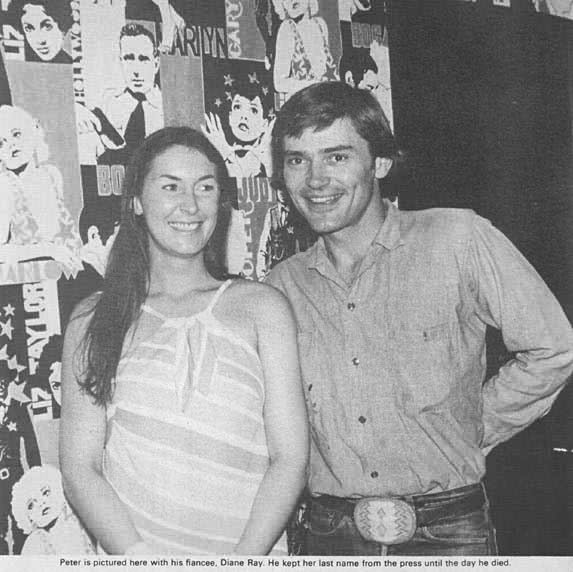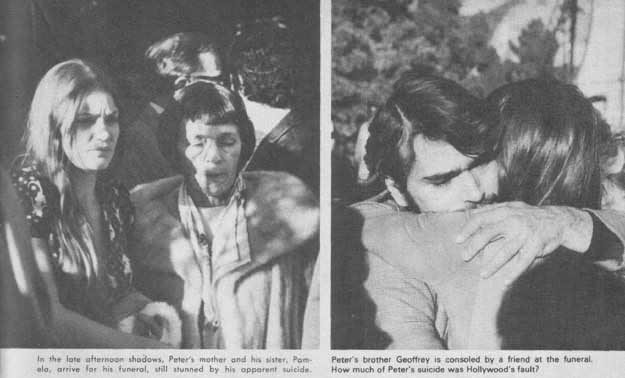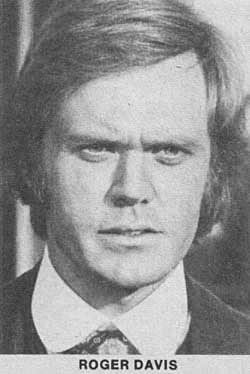- PETER DUEL
THIS WAS HIS LIFE:
- TV Star Annual, May 1972
 In
the early hours of December 31, 1971, Peter Duel whispered to
his half-asleep fiancee, Diane Ray, "I'll see you later,"
and left the bedroom of his simple ranch house. Seemingly moments
later, Diane was completely aroused by what sounded like a gunshot
in the livingroom. She tore out of the bed horrified by her suspicion
of what had happened. Her worst fears were confirmed when she
found Peter Duel's lifeless body lying beside their Christmas
tree.
In
the early hours of December 31, 1971, Peter Duel whispered to
his half-asleep fiancee, Diane Ray, "I'll see you later,"
and left the bedroom of his simple ranch house. Seemingly moments
later, Diane was completely aroused by what sounded like a gunshot
in the livingroom. She tore out of the bed horrified by her suspicion
of what had happened. Her worst fears were confirmed when she
found Peter Duel's lifeless body lying beside their Christmas
tree.
Police investigators found the weapon
near his body in a position which indicated that Peter had, indeed,
pulled the trigger. An autopsy later revealed that the bullet
had entered the right side of his head and had gone out the left
side, leaving a hole the size of a fifty-cent piece in one of
the near-by windows. For a shot of that intensity to be fired
from a standard revolver could only mean that the gun had been
held at extremely close range. Suicide was reported as the cause
of death, although Peter had left no note, nor had he ever indicated
that he was capable of taking anyone's life, let alone his own.
Six years ago, Peter Duel had a special
dream: to become enough of a star in Hollywood so that he could
return to New York, where his career had begun, with the freedom
to choose a strong, dramatic role in a Broadway play which would
most reveal his gift for serious acting. Several people who were
connected to Peter's life knew of this dream, and perhaps if more
had understood the implications behind it, Peter might have lived
to see the dream realized to its fullest potential.
Instead, Peter wandered through the goo
of GIDGET, the whipped cream of LOVE ON A ROOFTOP and the swash-buckling
slap-happiness of ALIAS SMITH AND JONES. With the last series
came Peter's real stardom. But this stardom was to be his nemesis.
He could not see his performances in the role of humorous Hannibal
Heyes as any sort of test of his ability or a credit to the acting
profession he strove to honor. His super-star status began to
humiliate him as he listened to interviewer after interviewer
ask endless questions about his super-star role, rather than about
the real Peter Duel, a sensitive artist who never felt comfortable
inside Hollywood's fanfare factory. As he once stated to a reporter:
"There's a kind of reality to all this press-personality
myth, but fame in show business is not in proportion to actual
achievement. What happens so often is that things get out of sync."
 When
Peter had recognized the opportunity to convey his own ideas,
he had reminded reporters of the two most difficult roles of his
career and how much they had meant to him: one as a junkie in
a sequence of THE PSYCHIATRIST; ("I wanted to show that addicts
are not that different from non-addicts. They're people who are
addicted, and they're not from another planet.") and another
as a patient in need of a kidney machine on THE INTERNS: ("It's
easier with my personality to perform a heavy, intense role.")
When
Peter had recognized the opportunity to convey his own ideas,
he had reminded reporters of the two most difficult roles of his
career and how much they had meant to him: one as a junkie in
a sequence of THE PSYCHIATRIST; ("I wanted to show that addicts
are not that different from non-addicts. They're people who are
addicted, and they're not from another planet.") and another
as a patient in need of a kidney machine on THE INTERNS: ("It's
easier with my personality to perform a heavy, intense role.")
A simple perusal of the room in which
Peter died reveals the most about this young man, and may, in
its own strangely obvious way, explain all Hollywood tried to
hide: Classical records containing vibrations of harmony and order
are piled high. There are numerous books revealing their owners'
wide intellectual curiosity and artistic discipline, such books
as Felix Greene's VIETNAM! VIETNAM!, Nathaniel Branden's PSYCHOLOGY
OF SELF ESTEEM; LOOK HOMEWARD, ANGEL, the complete works of Shakespeare,
Thoreau's ON MAN AND NATURE and a collection of Dylan Thomas's
poetry. Wildly colored surrealistic paintings and Peter's own
sketches adorn the walls, along with a "Keep the Faith"
poster.
Outside the simple ranch house, which
he only recently moved to from a $65 a month apartment above a
garage, stands a camper. Peter and Diane had spent every free
day in the wilds, eating natural foods and camping under the stars.
Peter had driven across the country, but he had preferred the
rugged accommodations of his camper to the luxurious motel rooms
his public would have expected him to enjoy.
Peter had been born and raised in Penfield,
New York, a small conservative town where his father was the only
doctor, his mother the only nurse. As a child, he was a loner,
preferring quiet walks in the woods near his home to the basketball
court of his school. Although he was an introvertive child, he
seemed to blossom on the school stage. But even in high school,
the idea of becoming a professional was "too weird to contemplate,"
as he once told a reporter. Peter was an indifferent student,
but along with some family pressure, he did concede that a college
education was important. No doubt to please his father, Peter
enrolled in St. Lawrence College as a pre-med student. But his
heart was not in his studies, and when his father came to see
him in a college production of "The Rose Tattoo," at
the end of his second year, Peter's grades were poor. His father
was genuinely impressed with his acting talents and said sympathetically;
"If you want to go to school, why don't you go to a drama
school, instead of wasting your time and my money here."
So Peter auditioned at the American Theater
Wing school in New York and was easily accepted. A change came
over him. Peter fell hard for the city most can't abide. Its highly
competitive pace seemed to awaken the dormant ambition in him,
and as the cultural center of the country, it provided Peter with
a whole new wealth of experiences. And it also seemed to provide
him with his lost Self, for as he once told a reporter: "I
realized I knew nothing about acting. But all of a sudden I committed
myself and recognized that this is an art and it isn't easy. That's
when the work began the pain, the self-searching, the asking 'That
do I do? What is acting?'"
Upon graduation from the American Theatre
Wing, Peter received his Equity card and joined the Shakespeare
Wrights Repertory Company as an assistant stage manager and performer.
He then toured with the Family Service Group in special "message"'
plays produced for schools, service clubs and PTAs. But his first
big break came when he was signed for the motion picture WOUNDED
IN ACTION, filmed in the Philippines. This led to a role in the
national road company of "Take Her, She's Mine"' with
Tom Ewell. When the show reached the West coast, Peter decided
to put his Broadway-via-Hollywood dream into effect.
Peter met Diane while filming THE PSYCHIATRIST.
She was a TV producer's secretary who lacked the glamor of the
starlets he had dated, but she was the girl he had long sought.
So protective of her was he that he was able to withhold her last
name from the press until the day it became public record in the
investigation of his suicide.

 Roger
Davis now portrays Hannibal Heyes for the ABC-TV series, Alias
Smith and Jones. He debuted in the 19th episode of the show's
1971-'72 season. Roger is well known to daytime drama viewers
for the eight roles he performed on the now defunct soap, Dark
Shadows, but he has also performed in guest-starring roles
for such popular nighttime shows as Bonanza, Twilight
Zone and The Big Valley.
Roger
Davis now portrays Hannibal Heyes for the ABC-TV series, Alias
Smith and Jones. He debuted in the 19th episode of the show's
1971-'72 season. Roger is well known to daytime drama viewers
for the eight roles he performed on the now defunct soap, Dark
Shadows, but he has also performed in guest-starring roles
for such popular nighttime shows as Bonanza, Twilight
Zone and The Big Valley.
Roger made his motion picture debut in
Parachute to Paradise, during a leave of absence from Dark
Shadows. Since then, he has co-starred in two films for ABC's
Movie of the Week: The Young Country and River
of Gold.
A native of Louisville, Kentucky, Roger
came to New York for his Bachelor of Arts degree at Columbia University.
He later earned his Masters degree from U.C.L.A. Roger made his
professional debut in ABC's dramatic series, The Gallant Man.
He has been married to actress Jaclyn Ellen Smith since 1968.
Back
to Articles List
 In
the early hours of December 31, 1971, Peter Duel whispered to
his half-asleep fiancee, Diane Ray, "I'll see you later,"
and left the bedroom of his simple ranch house. Seemingly moments
later, Diane was completely aroused by what sounded like a gunshot
in the livingroom. She tore out of the bed horrified by her suspicion
of what had happened. Her worst fears were confirmed when she
found Peter Duel's lifeless body lying beside their Christmas
tree.
In
the early hours of December 31, 1971, Peter Duel whispered to
his half-asleep fiancee, Diane Ray, "I'll see you later,"
and left the bedroom of his simple ranch house. Seemingly moments
later, Diane was completely aroused by what sounded like a gunshot
in the livingroom. She tore out of the bed horrified by her suspicion
of what had happened. Her worst fears were confirmed when she
found Peter Duel's lifeless body lying beside their Christmas
tree.
 When
Peter had recognized the opportunity to convey his own ideas,
he had reminded reporters of the two most difficult roles of his
career and how much they had meant to him: one as a junkie in
a sequence of THE PSYCHIATRIST; ("I wanted to show that addicts
are not that different from non-addicts. They're people who are
addicted, and they're not from another planet.") and another
as a patient in need of a kidney machine on THE INTERNS: ("It's
easier with my personality to perform a heavy, intense role.")
When
Peter had recognized the opportunity to convey his own ideas,
he had reminded reporters of the two most difficult roles of his
career and how much they had meant to him: one as a junkie in
a sequence of THE PSYCHIATRIST; ("I wanted to show that addicts
are not that different from non-addicts. They're people who are
addicted, and they're not from another planet.") and another
as a patient in need of a kidney machine on THE INTERNS: ("It's
easier with my personality to perform a heavy, intense role.")
 Roger
Davis now portrays Hannibal Heyes for the ABC-TV series, Alias
Smith and Jones. He debuted in the 19th episode of the show's
1971-'72 season. Roger is well known to daytime drama viewers
for the eight roles he performed on the now defunct soap, Dark
Shadows, but he has also performed in guest-starring roles
for such popular nighttime shows as Bonanza, Twilight
Zone and The Big Valley.
Roger
Davis now portrays Hannibal Heyes for the ABC-TV series, Alias
Smith and Jones. He debuted in the 19th episode of the show's
1971-'72 season. Roger is well known to daytime drama viewers
for the eight roles he performed on the now defunct soap, Dark
Shadows, but he has also performed in guest-starring roles
for such popular nighttime shows as Bonanza, Twilight
Zone and The Big Valley.